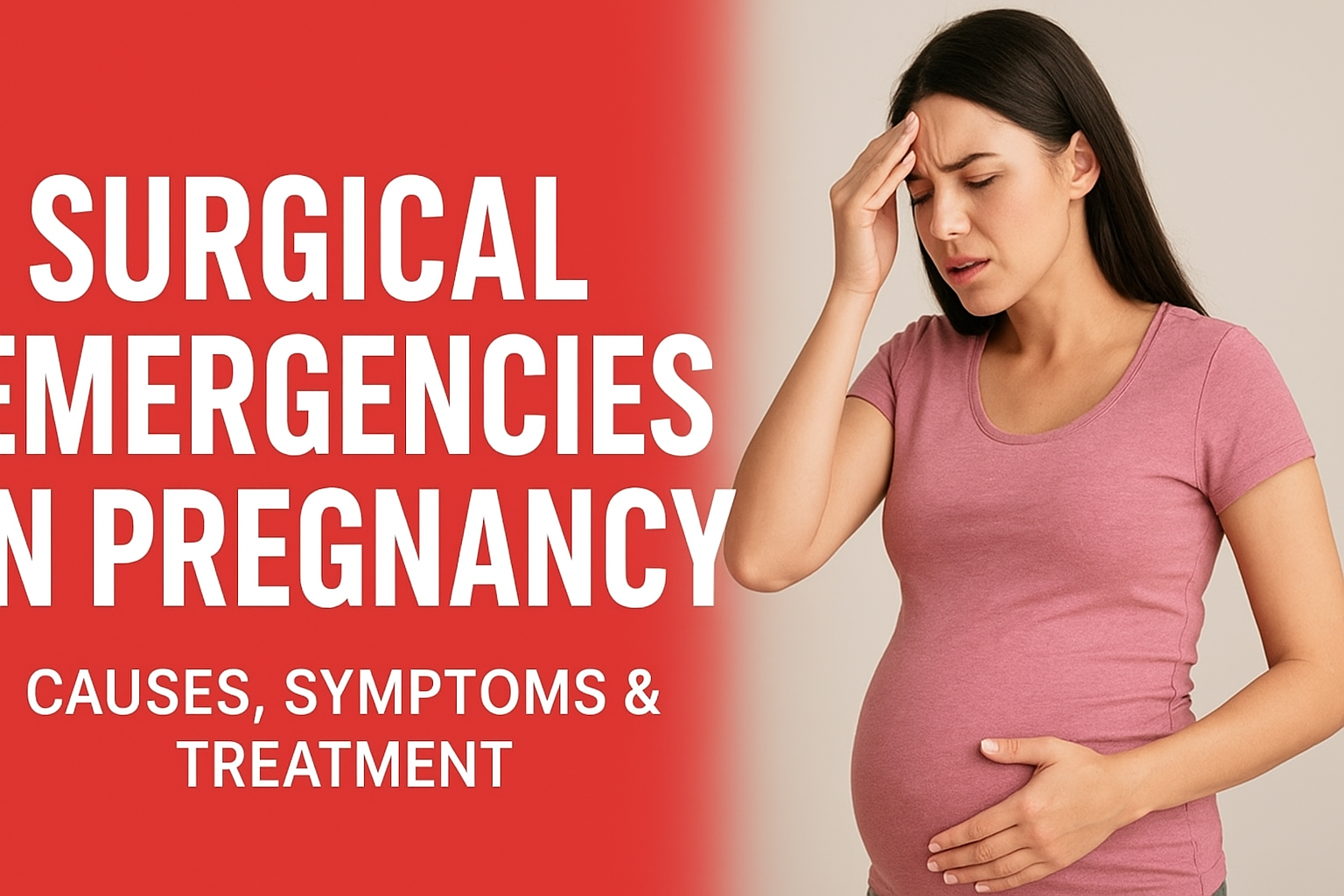Pregnancy is usually a time of excitement and hope. But sometimes, things do not go as planned. In rare cases, a pregnant person might face a surgical emergency. This means something serious is happening inside the body that needs quick surgery to save the mother, the baby, or both.
These emergencies are not common, but they can be dangerous if not treated fast. Understanding them can help you stay alert and know when to seek help.
What Is a Surgical Emergency in Pregnancy?
A surgical emergency during pregnancy is any condition that suddenly affects the mother’s health and cannot be treated with medicine alone. It needs immediate surgery to fix the problem. These conditions can happen in the belly area (abdomen), in the reproductive organs, or due to an injury.
Surgery during pregnancy is more complicated. Doctors must think about both the mother and the baby before doing any procedure. That’s why spotting the problem early is very important.
1. Ectopic Pregnancy
One of the most urgent problems in early pregnancy is an ectopic pregnancy. This happens when the fertilised egg grows outside the uterus, often in a fallopian tube. The baby cannot survive in this case.
If the tube bursts, it can cause heavy internal bleeding, which is life-threatening. Signs include:
- Sharp pain on one side of the lower belly
- Vaginal bleeding
- Feeling dizzy or faint
According to the American Pregnancy Association, about 1 in 50 pregnancies is ectopic. It usually needs surgery to remove the pregnancy and stop the bleeding.
2. Appendicitis in Pregnancy
Appendicitis is when the appendix gets swollen and infected. It can happen during pregnancy too. But it is harder to diagnose, because the growing uterus pushes the appendix out of its usual place.
Symptoms to watch for:
- Right-side belly pain (can move higher as pregnancy progresses)
- Nausea or vomiting
- Mild fever
- Loss of appetite
Delayed diagnosis can lead to the appendix bursting, which is very risky for both mother and baby. Most times, laparoscopic surgery is used, even during pregnancy. It is generally safe when done early.
3. Ovarian Torsion
Sometimes, an ovary twists around the tissue that holds it. This is called ovarian torsion. It cuts off blood flow and causes sudden, sharp pain.
Pregnancy increases the risk, especially if there are ovarian cysts. Without surgery, the ovary might get damaged permanently.
Symptoms include:
- Sudden pain on one side of the lower belly
- Nausea or vomiting
- Feeling light-headed
Doctors usually perform surgery to untwist the ovary. In some cases, they may remove it if blood flow does not return.
4. Placental Abruption
This is a late-pregnancy emergency. The placenta is the organ that gives oxygen and nutrients to the baby. Sometimes, it separates from the uterus too early.
This condition, called placental abruption, causes heavy bleeding and reduces oxygen to the baby.
Signs include:
- Belly pain
- Bleeding from the vagina
- Hard belly or frequent contractions
- Baby moving less
Placental abruption affects about 1 in 100 pregnancies. If it is severe, doctors may need to do an emergency C-section.
5. Uterine Rupture
Uterine rupture is a rare but life-threatening emergency where the muscular wall of the uterus tears during pregnancy or labor. It often occurs in women who have had previous cesarean sections or uterine surgeries. When the uterus tears, it can cause the baby to slip into the mother’s abdomen, leading to internal bleeding and danger to both mother and child. This condition requires urgent surgical intervention usually an emergency C-section. Possible signs include:
- Sudden, sharp abdominal pain
- A drop in the baby’s heart rate
- Vaginal bleeding
- Loss of contractions during labor
- Signs of shock in the mother (like dizziness or a rapid heartbeat)
While rare, uterine rupture can be fatal if not treated immediately. Hospitals like Vardaan Hospital, which specialize in women’s healthcare, are equipped to act fast in such situations to protect both mother and baby.
How Can You Reduce the Risk?
While not all emergencies can be avoided, there are some steps that can help:
- Go for regular prenatal check-ups
- Report any unusual pain or bleeding quickly
- Avoid risky activities or falls
- Eat a balanced diet to lower the risk of gallstones
- Know your body, do not ignore new symptoms
When to Call a Doctor
Call your doctor or go to the best hospital in Ranchi or in your locality immediately if you:
- Have strong belly pain that does not stop
- Bleed during pregnancy
- Feel dizzy, faint, or weak
- Can’t keep food or water down
- Notice your baby is moving less
Quick action can prevent a serious problem from becoming dangerous.
Conclusion
Surgical emergencies in pregnancy are rare, but they are real and serious. Knowing what signs to watch for can help you take the right steps at the right time.
At Vardaan Hospital, we have the best team of doctors in Ranchi, surgeons, and nurses who are trained to handle such emergencies with care. Our goal is to keep both mother and baby safe even in the most critical times.
If you or someone you know is expecting and has concerns about pain or strange symptoms, do not wait. Seek help right away. Early care saves lives.
